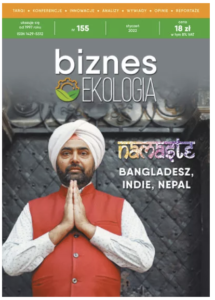 President of the Chamber – Artur Gontarczyk – gave an interview to the magazine “Biznes i Ekologia” on the activities of the Chamber and the Polish – Bangladeshi economic cooperation. The interview will be published in the January 2022 (155th) issue of the oldest Polish magazine in the ecological business sector. We invite you to read it!
President of the Chamber – Artur Gontarczyk – gave an interview to the magazine “Biznes i Ekologia” on the activities of the Chamber and the Polish – Bangladeshi economic cooperation. The interview will be published in the January 2022 (155th) issue of the oldest Polish magazine in the ecological business sector. We invite you to read it!
Why was the Chamber established? Who founded it? What successes has it had since its inception? What are the plans for 2022?
The idea to establish the Chamber came about by accident. Thanks to numerous international relations, I came into contact with entrepreneurs from Bangladesh in the course of my legal activity. I quickly realised that the space for cooperation with this market had not been developed in any way (at least institutionally), and the Poles knew nothing or very little about Bangladesh. I passed the idea of setting up the Chamber to my friends, who quickly took up the topic. I managed to infect many entrepreneurs with the idea, who registered their businesses to the Chamber.
From the very beginning we focused on information activities. First of all, we try to provide data on the way of doing business in Poland and Bangladesh, as well as to develop knowledge about both countries. To this end, we run a constantly updated blog and a reliable information service.
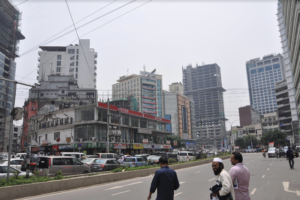
We have established contact and started cooperation with the Centre for Bangladesh Studies “Bangabandhu”, which was established in January 2019 at the Institute for Near and Far East at the Faculty of International and Political Studies, Jagiellonian University. Together with the Jagiellonian University, we organised the celebration of Rokeya Day – the equivalent of Women’s Day in Bangladesh. Interestingly, the Chamber published the first ever Polish version of a well-known novella in Bangladesh, whose author is the aforementioned Begum Rokeya – a Bengali thinker widely regarded as a pioneer of the women’s rights movement in South Asia. This booklet – ‘Sultana’s Dream’ – is available on our Chamber’s website for free download.
We have managed to interest the Chamber in the activities of one of the last Polish ambassadors in Dhaka – Mr Professor Jan Głuchowski, with whom we plan to conduct an interview. We are also conducting research into the history of Polish-Bengali relations based on the archives of the Ministry of Foreign Affairs. The Bureau of the Chamber has also established contact with the Polish Honorary Consul in Dhaka Mr Reshadur Rahman and the Federation of Bangladesh Chambers of Commerce in Dhaka. We conducted a number of interesting interviews with interesting characters, available on our blog.
The Chamber is also taking steps to restore the Polish embassy in Dhaka, which was closed down in the early 2000s. We have held many talks to this end – whether they will bear fruit, time will tell.
Thanks to the Chamber’s powers provided for in the Polish law, the Chamber, observing the problems of entrepreneurs, regularly addresses the Polish authorities – ministries, central offices, etc. Thanks to the explanations sent, our members are certain that they act in accordance with the law. We also want to open an information point on legal and business assistance in Poland and Bangladesh. As you can see, there are many projects and challenges.
What is the trade exchange between Poland and Bangladesh like?
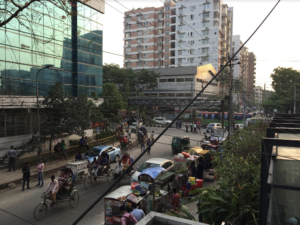
According to the analyses of the Polish authorities, the exchange is very asymmetrical. Imports of products from Bangladesh to Poland are many times greater than the reverse relationship. Poland mainly imports textiles and clothing from Bangladesh. Polish clothing brands are well-known in Bangladesh. The Chamber is pleased by the fact that Polish entrepreneurs are very much involved in that market, but perhaps most of all by the fact that more and more entrepreneurs see the need for good working conditions, health and safety at work and decent pay. Besides, Bangladesh exports tea, seafood (famous prawns) and spices.
Bangladesh imports machinery, metal products, fruit (our apples are very famous), sweets, powdered milk, etc. from Poland. Unfortunately, as the trade department of the Polish embassy in Delhi points out, the value is still too small compared to the textile imports to Poland. Bangladeshi businessmen are very interested in importing Polish beef (which has an excellent reputation in the local market), as well as leather for making shoes or belts etc. Of particular interest is leather from the head of a bull (which is said to be excellent for making sturdy shoe components).
It seems that the Chamber’s task is to inform entrepreneurs about procedures, opportunities and threats related to export. A great help is provided by Polish diplomats, who remain open to all questions and suggestions.
How numerous is the Bangladeshi diaspora in Poland? What does it do?
Bangladeshis are fascinated by Poland. According to our observations, they really like our nature, climate (especially the snow!), monuments and people. Many of them live in Warsaw, Silesia, Cracow and Pomerania. They have their own Internet forums and communicate efficiently. Information given to one group reaches the other very quickly. In this sense, they are extremely well organised. But it seems that they are not a closed, hermetic group.
Do you organise cultural events in cooperation with the Embassy of Bangladesh?
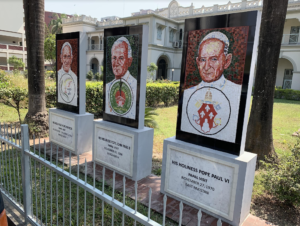
The Bangladeshi Embassy is very open to cooperation and often invites us to participate in joint events. The Warsaw post is also very active in the cultural field (cooperating, among others, with the Asia and Pacific Museum and Bangladeshi artists). In the beautiful building of the embassy in Warsaw there are many works of art – it is worth visiting and seeing for yourself. The Presidium of Chamber met several times with the country’s previous ambassador to Warsaw, Mr Muhammad Rahman. Currently, the Ambassador of Bangladesh is Ms. Sultana Laila Hossain. Due to pandemic restrictions, we have not yet had the opportunity to meet with the Ambassador, but as soon as the opportunity arises, we will certainly seek to do so.
Have any members of the Chamber been to Bangladesh? If so, what captivated you about that country?
Yes, both I and the Vice-President of the Chamber, Jakub Bałtroszewicz, have been to Bangladesh several times. For the average inhabitant of Poland, the aura (the stuffiness and dampness) and the sheer volume of people, the noise of cars, horns, etc., are certainly shocking. But this is only the setting. What is fascinating are the people and their approach to strangers. Everyone is very friendly and open. A thing we quickly discovered was the common gesture for greeting. When shaking hands, Bangladeshi immediately place their hand over their heart – showing respect and joy at meeting you. We were also surprised by the tolerance for other cultures and religions (in the centre of Dhaka there is a beautiful cathedral that the Holy Father has visited many times, with mosques standing next to it). The extraordinary hospitality allowed us to get to know the wonderful cuisine of this country and the great attachment to family (mainly parents and grandparents). An interesting adventure for me as a lawyer was a completely accidental meeting on the plane with a judge of the Supreme Court of this country, with whom I had an interesting conversation. This country certainly has its problems. Many are waiting for an urgent solution. Once you will visit Bangladesh for even a while, you want to come back for more.
Are the Bangladeshi citizens working in Poland skilled workers? In which industries do they work?
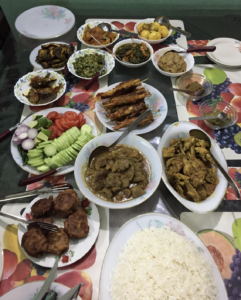
Our observations show that obtaining a Polish visa is extremely difficult. A random unskilled worker has to be very lucky to get through verification. Mostly construction workers (who have already done some work in Singapore, Saudi Arabia or South Africa), as well as people who speak good English and have something to offer, come to Poland. At the educational fair in Dhaka we had the opportunity to meet many young people who dreamed of continuing their education in Poland. Many of them were well-educated, open-minded and spoke many languages well. Many of them asked about studies in clothing design – an art not so popular in Poland.
After their arrival, many workers verify their plans. They often try their hand at the catering business, setting up so-called “kebab shops”. As you can see, there seems to be a demand for such services, because they cook deliciously and there are more and more such places.
Unfortunately, due to their lack of knowledge of the rules and ignorance of the realities, they often fall prey to various scams. The Chamber often tries to help, but sometimes it is too late. This confirms the usefulness of the organisation of the Chamber’s Legal Information Centre.
How are they perceived by the inhabitants? Is it possible to assimilate them?
I must admit that initially I was very cautious in assessing the mutual relations between the two nations in direct contact. However, later I realised that Bangladeshi people do not complain about life in Poland (I know from many contractors that it is different in other European countries). Poles are usually friendly and open – often despite the language barrier. Bangladeshi are also very tolerant in religious and cultural matters. If they don’t understand something, they often explain it by saying “it’s just a cultural thing”, meaning “it must be due to culture” and that’s just the way it is. I was surprised to find that Bangladeshi are the first to send me wishes on many Catholic religious holidays (and not by sending popular chain letters, but personalised greetings). Many of my contractors regularly ask about my family and their health. They also have a reputation for loyalty – if they use your service, they will use it for a very long time. From this perspective, I think assimilation is possible. However, I also believe that the state should have a prudent immigration policy – but that’s a topic for another discussion.
The interview in the Magazine can be downloaded here.

